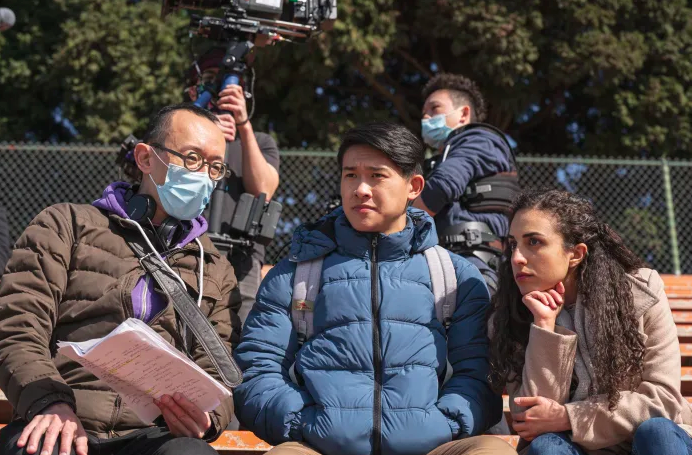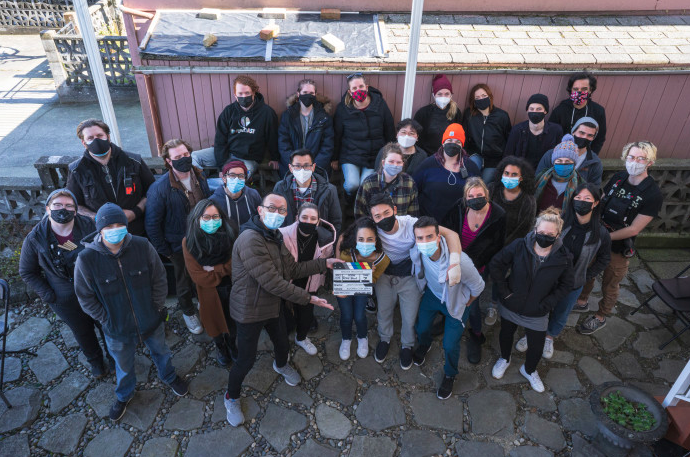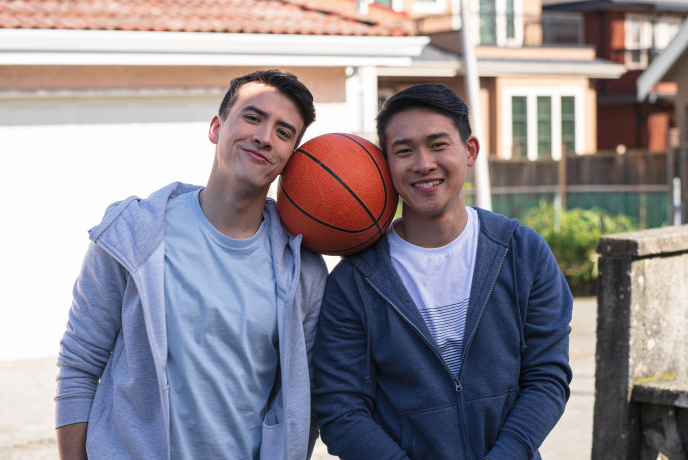
L TO R: DIRECTOR JASON KARMAN, CARDI WONG (JAKE), AND PARMISS SEHAT (VALERIE). PHOTO CREDIT: SYD WONG
In watching pieces from this year’s BAAFF lineup, I am sometimes struck by the gradual transition in storytelling perspective. Golden Delicious is a story about a high school teenager coming to terms with his sexuality while navigating his father’s domineering expectations of him. Though the plot sounds like it belongs to the burgeoning LGBTQ teen films of the early 2000s, one cannot help but notice the intersectionality of the character, who faces second-generation issues. Instead of his parents pushing for the unattainable American Dream (though it should be noted that this is set in Canada) as set by many Asian immigrants, Jake is pressured to play basketball. Golden Delicious is also undeniably a great service to teenager years in portraying those youthful mistakes and growing pains. Based in the Vancouver area, director Jason Karman has directed many short films since his first credit, Stacey & Mary, in 2005. In speaking with Karman, I felt like I was directly speaking to someone has seen the growth of Asian queerness on film: the lack of representation, the struggles on making a story come to life, and what we can hope to see moving forward.
BOSTON HASSLE: A lot of your filmography involves, either directly or indirectly, sexual identity. I was wondering how this story stood out to you in particular.
JASON KARMAN: It’s the first time that I’ve done a feature, or long form storytelling. For me, it’s about weaving in the subplots to support or subvert the main plot. You have Jake’s sexual identity, but he doesn’t live in a vacuum. I needed to selectively choose who else was around him that would support him or subvert it.
I wanted to be able to tell a two-hour film because in the past, I’ve done so many shorts. Frankly, a lot of people are going to judge me on my ability because they’ve always said to me, “You can tell a short film. Can you do a long form?” That’s the main thing that I was aware of.
With long form storytelling, I’m able to explore sexual identity more deeply. I can take my time when two people meet, and explore the nuances of when they meet instead of distilling it into a hookup. For example, one of my favorite scenes is when Jake has his first intimate moment with a man and it’s very slow and nuanced and magical in a way. That’s how I remember my special time — when you lose track of time.
BH: It kinda reminded me of Spa Night, if you’ve seen it.
JK: Andrew Ahn (the director of Spa Night) is actually one of the Indiegogo contributors.
BH: You mentioned the pros of working in long form. I was wondering if there was anything different that you might prefer in short films?
JK: The nice thing about short films is that it wraps up quicker. This was a lesson in sustainability and endurance. We shot for twenty days, and I knew it was going to be about twenty-five days, but we only had a budget for the twenty days. Lo and behold, we needed to do three more pickup days. In order for me to have that opportunity, I decided to embark on an Indiegogo campaign.
The one that I’ve done for myself often is create my own opportunities. I don’t wait for anybody because I’ve just found in the past that very people will give those opportunities, so you have to do it. The con of long-form storytelling is the amount of energy and resources it takes. It’s bittersweet. I love the characters and they are so alive in my mind, but I’m also thankful that it’s over. It’s out there and it has a life of its own.
BH: What specifically did you need the Indiegogo campaign for?
JK: We filmed this during the pandemic – it was March 2021 – and we lost a location due to COVID. I do community outreach, so I was supposed to offer learning opportunities for film students at a high school. I’m not a teacher so there wasn’t a conflict of interest. In exchange, I was going to only be charged custodial rates to be in the school for $150-600 a day, Canadian dollars. When the pandemic went down, I wasn’t allowed to film there. I had to find another location and fortunately, I found a newly emptied high school. They allowed us to film, but it was $2,000 a day. We saw quickly how our budget just went out of whack. The producer and I made a call to just bite the bullet and go along with it. We basically funneled our post-production funds over to production in order to keep the train going.

THE CAST AND CREW OF GOLDEN DELICIOUS. PHOTO CREDIT: SYD WONG
BH: How did the cast members get involved?
JK: It was a two and a half month process. We started in December 2020. I used a fairly new casting agency and basically relied on their network. With the restrictions in place at the time, it was hard for me to hold an in-person casting, so everything was done over Zoom. I relied on the expertise of the casting directors, who are Errin Lally and Annalese Tilling. They spread the word around Vancouver and even in Toronto and that’s how we got submissions and how I did my first Zoom callbacks.
It was slightly unnerving because I’m used to making choices by seeing people in person. Here, I was casting the biggest project of my life based on what I see in front of the screen and hoping that what I read from them and what is not specifically said is accurate. I feel like Jake is someone who’s vulnerable and I could watch him for hours. When I found the person with charisma, I did the chemistry test via Zoom to see how they could be a family together or friends, lovers.
BH: Cardi Wong did an amazing job of being likable, fragile, and also there for his friends and family when he needed to.
JK: I can share with you now that he won the Best Actor Award at the Reelworld Film Festival. The film won Best Film. I won Best Director. Gorrman Lee won Best Writer. We got several awards. This was just announced thirty minutes ago.
BH: That’s so awesome. You just mentioned the writer, Gorrman Lee. Did you know him personally or did he come up to you with the script?
JK: I met him through a screenwriting center back around 2012-2013. We were introduced, and when I read Golden Delicious I thought it was an outstanding script. It was very visual and well-written with a great sense of pacing. At the time, I tried to raise money for it but I couldn’t. It stuck with me and Gorrman Lee worked on a couple of my shorts as a story editor. I learned to trust him and we visited the project again in 2018 and refined it further. To answer your question, we were introduced and then we learned to trust each other and respect one another.
BH: One of the things I loved about the movie is — and I can’t find the right word so I’m calling it the teen vibe. I think it really captures the experience of fleeting youth, but also being that youth and wanting to capture that within that moment, like when Jake is taking pictures of his friends. The music especially made me feel nostalgic. What movies impacted you as a teen or are there any movies that remind you of being a teenager?
JK: Flight of the Navigator. And Back to the Future, of course. I just recently watched The Breakfast Club, but I’ve seen so many different clips of it and I already knew it was the zeitgeist in my mind. I was influenced by a lot of ‘80s films. When I came to Canada from Indonesia, I was blown away by the synth pop soundtrack of many films during that era. The Neverending Story was another favorite film and that track kinda stayed with me.
It wasn’t until the 1990s when I was starting to realize that I was queer. I was exposed to a couple of films and realized, “Wow, this is actually who I am.” One of the films was Beautiful Thing by Hettie MacDonald. It was a British film and it had the Mamas and the Papas as the soundtrack. To this day, every time I hear the Mamas and the Papas, I think of that film and how sweet and enduring love can be between two men. I want to make a note that I didn’t start seeing queer Asian stories until the late aughts. That’s when I met Andrew Ahn, who did a short film called Andy. I also saw a film called Soundless Wind Chime from Europe, and it started to dawn on me that there weren’t a lot of stories about queer Asian men.
BH: I feel like the latency between first watching a queer film and first watching a queer Asian film was long for me as well, especially because it’s not something I was able to stumble upon. You had to actually search for it on some pirating service.
JK: The democratization of media has made it easier to find stuff. It’s also a lot noisier these days, so knowing where to go is still tricky.
By the way, I’m glad that the film resonated with you. There’s a part of me that’s curious to know if the film resonates stronger with someone who identifies as queer or someone who identifies as an underrepresented community member, like Black or Indigenous or South Asians. It just recently played at its first niche festival dedicated to BIPOC stories in Toronto and it seemed to hit a nerve, much more than anticipated since they weren’t necessarily queer. That was nice. The audience was also very jovial, much more so than if it was a mainstream, predominantly white crowd.

L TO R: CHRIS CARSON (ALEKS) AND CARDI WONG (JAKE). PHOTO CREDIT: SYD WONG
BH: Jake and his sister Janet seem to represent a second, or even third, generation of immigrants. Their parents are past the “doctor/engineer” expectations knowing that that kind of American Dream won’t work, but they still are able to put the same amount of pressure on their kids. I was wondering how their Asian identities played into their journeys.
JK: When I got Gorrman’s script, I would say that I thought they were a bit more selfish in the sense that they were concerned about their personal happiness. Once you get past moving into a new country and getting yourself settled, you’re past survival mode. A lot of first-generation immigrants are on survival mode, but once you get past that, you can start doing activities that are fulfilling to do, which would be a luxury. I was actively thinking, “Are each of these people happy with where they are in life? Are they happy in their careers or happy in their interpersonal relationships?” Once you settle into a place, you’ll sometimes ask yourself, “Is this it?” There’s that process of reconciliation where you either decide to pursue that or abandon it altogether and just do the right thing.
On top of that, you have social media layered on top there. It’s easy to doubt and question whether you’re on the right path. I was thinking about the effects of technology on each of these people, including the parents. Perhaps the dad finally found Tinder and got caught up with the new person, not realizing that he’s potentially hurting someone else.
BH: What other stories would you like to work on or see on screen?
JK: Comedy is one of the hardest things and I’m so glad that people can see the dry humor coming through. I don’t think I’m a very funny person, but I sometimes think of funny situations. I would like to work on more slice-of-life dramas with moments of humor and catharsis in between. I’m still interested in queer Asian stories, so I’m drawn to stories about male fragility, role models, and reconciliation. I want to add legacy to that as well in terms of what we leave behind and who is going to take care of us. I’m growing older and there aren’t a lot of stories about aging queer people. Things that regular forty-year-old face when they’re queer and alone trying to reconcile their aging bodies while there is an emphasis in the queer community placed on young bodies. How do you remain relevant?
BH: Aging is definitely a scary thing, especially how we try to fight it. But it’s nice to have more representation that isn’t just queer trauma.
JK: I do believe in positive, uplifting endings because of how films historically end in tragedy. I’ve had conversations where friends are saying, “That’s not realistic.” I think when young minds watch movies, it’s important to portray a positive image for queer characters regardless of whatever’s happening in the world. It’s more empowering and it’s better to show hope than despair.
Golden Delicious
2022
dir. Jason Karman
120 mins
Part of the 2022 Boston Asian American Film Festival. GOLDEN DELICIOUS screened Sunday, October 23 @ 2PM at the Emerson Paramount Center

